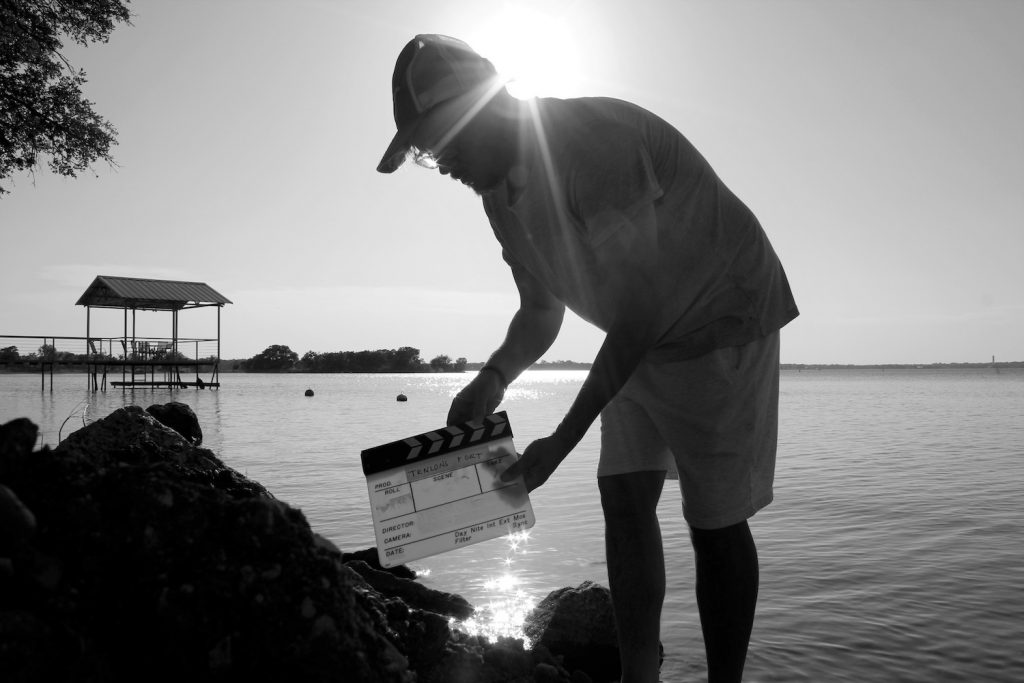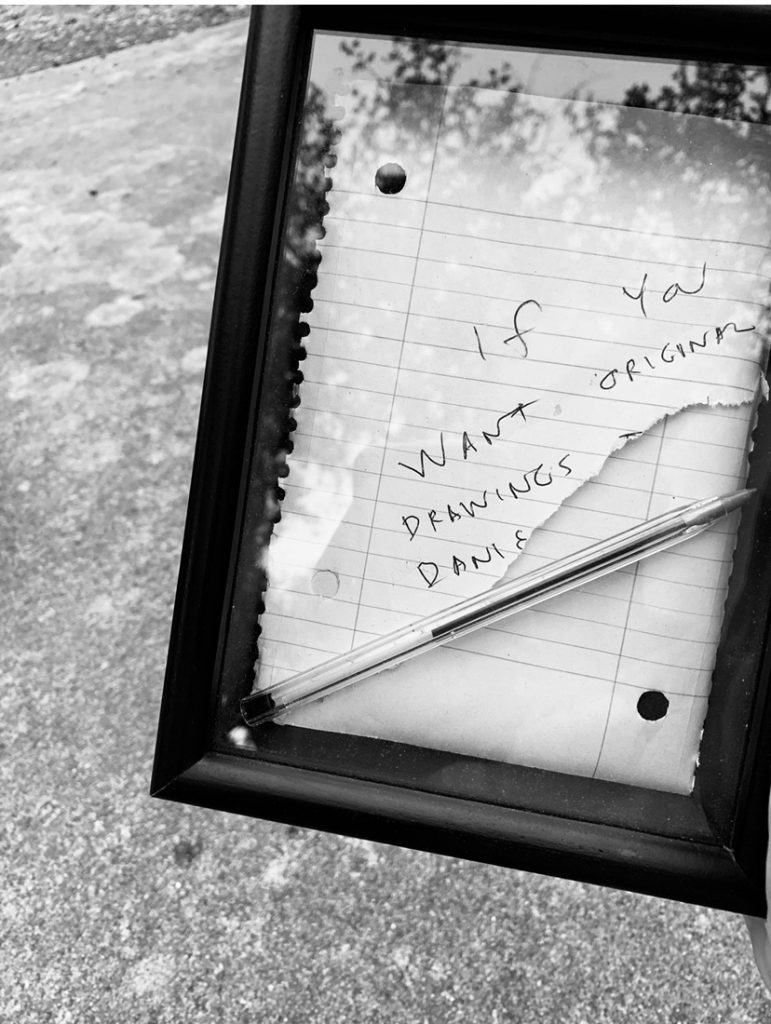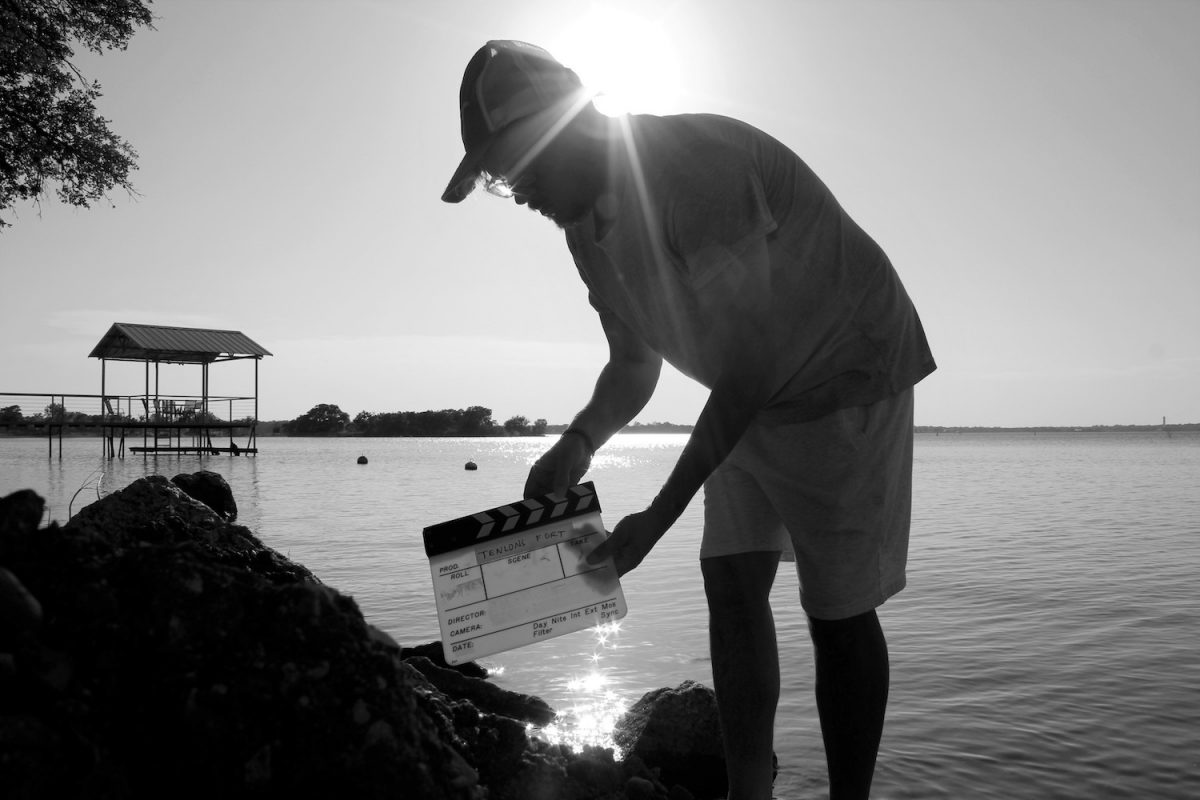
While rolling through the small town of Waller, Texas, singer/songwriter Jack Gibson watched his hero Daniel Johnston start to fall asleep in the passenger seat. At the wheel was Johnston’s brother and manager, Dick Johnston, who’d just escorted the hungry trio of Texans out for a bite to eat. After that, it was time to relax.
“We’d just had dinner at his favorite Mexican restaurant in Waller,” says Gibson (a.k.a. Tenlons Fort), who was in town working with the lo-fi legend for a few days in June 2018. “We got the extra tortillas and the tall Cokes. After that, Dan started to shut down for the day. His eyes were closing. We were headed over to the hotel where I was staying, but that’s when she called him.”
The “she” calling was the fabled Laurie Allen, Johnston’s longtime crush and muse. Any fan of Johnston’s music knows of this well-documented infatuation saga. “It was a special thing to witness,” says Gibson. “Laurie just happened to call him for the first time in 13 years. I was in the backseat. I heard the conversation, and it was one of the most romantic things in the world. It was the first time since they spoke at the screening of the (Devil & Daniel Johnston) documentary in Austin in 2005. They talked on the phone for about 10 minutes, and it was mind-blowing.”
Understanding the heaviness of the moment, Gibson listened intently to Johnston’s end of the conversation: “Is it really you? Is it really you? Oh, Laurie! You’ve got to save my life. Can you come to Texas? Oh, I love you so much. Are you happy? You doing pretty good? Oh, I’m doing real good, especially now talking to you.”
That bit of sentimental dialog is now cemented in music history thanks to “Hey Dan,” the new Tenlons Fort song dedicated to the late songwriter. The tender and serene track fully channels Johnston’s eccentric spirit.
“Part of the talking bit I’m doing near the end of ‘Hey Dan’ is what he said to Laurie,” says Gibson. “I won’t say everything that was said on the phone—that’s just a little glimpse of what I got to hear. The way he was speaking and his tone was just so romantic and revering after all of that time. It was the most intimate concert of words I’ll probably ever hear in my life. I’ll never forget it.”
When Johnston hung up the phone, he came alive and was inspired to hit the music room. “After that call, we went back to his house and jammed on the instruments,” says Gibson. “It was the classic, ‘I’m tired—she called me—now I’m awake, let’s write a good song!’ It was beautiful.”
Aside from recording and performing music, Gibson, an Austin-area native, is also an artist and screenwriter. His diverse film resume includes work on television shows, writing and production work on Gus Van Sant films and his own 16mm projects.
Tenlons Fort’s “Hey Dan” was recently issued via LaunchLeft, which will also release Sober October. The forthcoming LP, due October 19, is Gibson’s sixth album and was produced by Larry Crane (Elliott Smith, Sleater-Kinney, Decemberists).
MAGNET recently spoke to Gibson about what he’s been up to this crazy year, sobriety, Gus Van Sant, Elliott Smith and, of course, Daniel Johnston.


You’re a nomadic person. Where have you been staying now since COVID-19 hit?
Since 1992, my trifecta of work cities is Austin, Los Angeles and Portland. I bounce around all three depending on what project I’m working on. This year, on February 5, right before SXSW, I came back to where I grew up. It’s about 30 minutes outside of Austin, Texas. Since the shutdown, I’ve just stayed here. I’ve been taking these long, 10- to 15-mile bike rides back in these neighborhoods where there are not a lot of cars. It’s just deer and roads. I put on the Doors’ “Riders On The Storm” on repeat and just cruise.
Given the pandemic, I’d imagine it’s an odd time to promote new singles and albums?
Yeah, who knows when people will tour again. I’m not fretting about it anymore. I already went through my breakdown in early March. For the first few months, I didn’t do anything. I shutdown. I was already going through some hardcore anxiety in February for some reason. I don’t know if it was early anxiety because I was picking up on a big world change or what. Luckily, I had like 30 Writers Guild DVDs, so when I got home, I just watched every movie like three times over. I just hid in my room for a while.
Your new album is titled Sober October. Why that name?
You just hear that term a lot. People don’t consume alcohol in October for whatever reason. I haven’t had alcohol for, like, 12 years. Aug. 23, 2008, was my last drink. That’s been a huge part of my life. But I do smoke a lot of weed, so I am not completely sober. I guess Alcohol-Free October should be the album.
Your new single, “Hey Dan,” is about Daniel Johnston. How’d you meet him?
I worked with Dan and his brother Dick for a short period of time. Sometime around March of 2018, I started some conversations with Dick on the phone. In June 2018, I went to Waller and got to hang out with Dan for a few days. We played some music and went over life stories and all that. I was doing a lot of archival work for Dick for about a year and a half, off and on.
Looking back, what stands out most about Daniel’s house in Waller?
All of the walls were covered in VHS tapes, genre by genre. It was like a huge video store at his house. Then he had a different room for everything. He had a drawing room, a main chill zone in the kitchen, and then his music room. I got to spend time playing bass back in that music room with Dan on the piano and double piano.
Was Daniel in good spirits when you were with him?
When I was there for two days, he was in great spirits. Dick told me, “He wants some Queen bootlegs. If you bring him some Queen, he’ll be super happy.” I stayed up the night before ripping and burning Queen concerts, interviews and bootlegs off YouTube. I wasn’t going to show up empty-handed. When Dan wants Queen, you heed the call. I showed up, and we spent the first hour talking about Queen. That was a great 48 hours. His spirits were high.
A year later, you returned to Waller. Was he in just as good of spirits?
He wasn’t as up-tempo. He was a little more tired, but it was beautiful. When you’re talking and hanging in Dan’s world, it’s pretty amazing no matter what. I look back at that time now in astonishment. You get these rare moments in life where you get to meet one of your heroes, someone who I looked up to and changed the world with their artistry through all of their struggles. To be a part of that story, even for a short time, is pretty amazing. At Dan’s memorial, I got to meet so many of his friends and other people who had the same experience. People who got to spend only a certain time period with him—but it will forever be with them.
When was “Hey Dan” written?
In September of 2018. I wrote it when he was still here in this dimension. I spent my Dan hang out time in Waller, then I went to Portland. I usually go to Portland in August or September. I like to go up there and recharge: hike in the woods. It’s a real artistic place for me. Then I got to go back to Katy, Texas, and work with his brother Dick some more the next year (on some archival projects). I was happy I got to play him the song.
How old were you when you first started playing music?
After high school, I got a guitar. 1996 is the first time I recorded under the name Tenlons Fort, and it was noise, sound-collage recordings. Fostex four-track type stuff. In 1999, I started writing songs, and I did that until 2003. Then I was at this incredible art residency in Sisters, Oregon. That’s when I found out Elliott Smith passed away. It was horrible. I saw so many of his shows, and I still think he’s the best of the best. Those songs are so beautiful. At that time, I wrote down all of the songs that I’d written from 1999 to 2003, and I had a good little stack of 20-30 songs. I basically erased all of those and started over again in 2003. I was like, “OK, let’s really do this.” I started from writing new songs, and then I recorded that first album in 2005.
When you’re writing your songs, what’s your process?
I always keep my stuff pretty simple. I’ve done six albums, and I’ve never written a bridge. I enjoy that about it. I try to work simply and then put a lot of emotion behind the simple structure. I remember listening to the Beatles and Beach Boys when I was six. Now I’ve listened to 500 hours of Nirvana concerts and watched Kurt utilize a great structure and put a lot of emotions into his songs. But at the same time, in honor of Brian Wilson, I’ll say, “Let’s listen to and learn Gershwin’s ‘Rhapsody In Blue’” … and then I just laugh. It’s so complex. My brain does not work that way. There’s stuff I’ll listen to that I’ll vibe with immediately on an emotional level, or I like to listen to stuff that’s so far beyond my comprehension and is so puzzling.
You grew up around Austin, how was that?
I graduated high school in 1991, I’m 47. I grew up in that late-’80s Austin period when Slacker was being made and the Dobie Theatre was showing Eraserhead and stuff. Then I went out to Los Angeles for a while and worked in TV and movies for a spell. After the riots, I went up to Portland. That’s where I went to film school in 1994 at Northwest Film Center. On Nov. 10, 1994, there was a double feature of El Topo and Gus Van Sant short films with both Gus and Alejandro Jodorowsky in attendance. That’s the night I met Gus. I was making a 16mm film named Don’t Leave Me Georgetown with Michael Parker from My Own Private Idaho.
Early on, what were some of your film jobs?
When I was growing up, I was doing stand-in work just to learn the ropes. I had my actors union card. I never wanted to be an actor; it was just a way to get paid and learn on sets. I was working on fun stuff, now classics of my era, like 90210 and The Wonder Years. Movies like Toys with Robin Williams and Falling Down. Then, when I moved to Portland, I was just doing experimental 16mm film. Back in ’96, after going to film school, my friend Andy and I worked with Gus Van Sant on adapting the original book of Don’t Worry He Won’t Get Far On Foot for Robin Williams’ production company. I was young and working on that adaptation. We worked on it for two years or so, but it never got made. Then they had some other writers for two years and it never got made—at least not then. More than 20 years later, Don’t Worry got made with Joaquin Phoenix when Gus brought the project back. It was something that’s been a part of my life for more than 20 years.
You’ve worked with Gus on other films, too, correct?
I was there on Elephant and Last Days, when he was making those experimental films. He really makes films like a family unit. There are a lot of people who’ve worked on multiple films with Gus. Working on Elephant was like a priceless film school.
Is Gus always as chill as he appears in interviews?
Super mellow, short answers. He’s always working and painting. Now he’s going back to his first love. He grew up a painter at the Rhode Island School Of Design, so now he’s back doing a lot of water colors. It’s awesome to see his huge, mega-paintings.
You’ve gotten to meet and work with some of your heroes, huh?
I think about it sometimes. I’ve done film and music since I left school, my whole life. I don’t have a million dollars in the bank. I am quarantining in the attic of my childhood home where I used to live with horror-movie posters on my wall. Now I’ve got posters on the wall of music and movies I’ve worked on. It’s a pretty cool full circle. Somehow, I got to meet Daniel Johnston. Somehow, I got to meet David Lynch and Brian Wilson. Somehow, I got to know and watch Elliott Smith’s early career. I wouldn’t be making any art if I hadn’t found and loved those people. It’s a dream bubble. There is heavy shit going on in the world right now. Heavy as can be. The only way for me to be artistic is to look back at some of the things I’ve done and get inspired.
—Rich Tupica






